- October 15, 2023
Why Does My Dog Eat My Hair? 11 Common Reasons
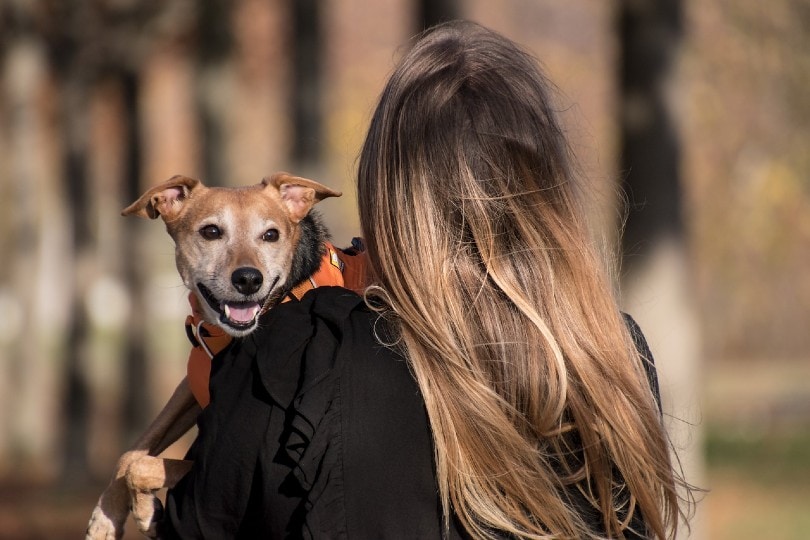
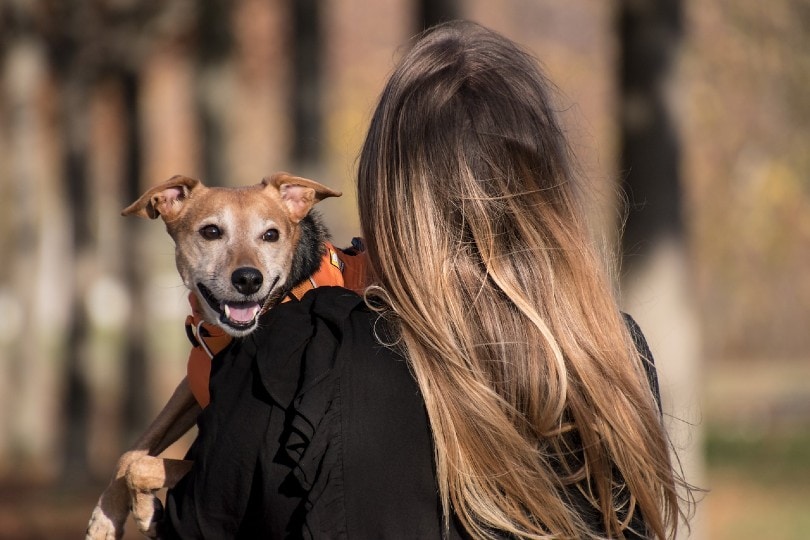
Ever caught your canine companion munching on your hair and wondered why? It’s not a gourmet meal, after all. This behavior, while strange to us, is actually quite common and can be attributed to various causes. From their inherent grooming instincts to anxiety issues, dogs eat hair for a myriad of reasons, which we’ll explore in this article.

The 11 Reasons Why Dogs Eat Your Hair:
1. Pica and Other Health Issues
Pica is a condition where dogs ingest non-food items, including but not limited to, hair. If your dog consistently eats hair, they might have pica. This behavior can be dangerous, as hair isn’t digestible and can cause blockages in their digestive system. The cause of pica can vary, from dietary deficiencies to boredom or anxiety, and should be addressed with the help of a vet.
Certain health issues, such as gastrointestinal problems or nutrient deficiencies, can also cause dogs to eat hair. In these cases, hair eating could be a sign of an underlying problem that needs to be addressed. Regular check-ups with your vet can help deal with these issues early.
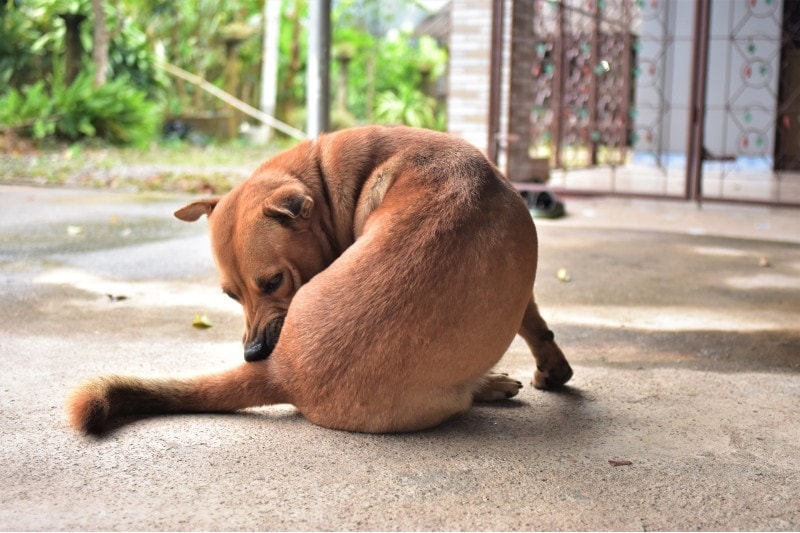
2. Grooming Instinct
Dogs groom each other as a social bonding activity. They may extend this behavior to their human family members, which can include eating hair. This is more common in dogs that are particularly close to their owners. However, if your dog is ingesting large amounts of hair, it could lead to health issues.
Female dogs also often lick the hair of their puppies as part of their grooming and cleaning process, which can give the appearance that the mama dog is eating the hair. This behavior is instinctual and helps keep their puppies clean and free from parasites. If your female dog doesn’t have puppies but is exhibiting this behavior on you, it could just be that your dog is trying to take care of and groom you.
3. Anxiety and Compulsive Behavior
Dogs often resort to unusual and compulsive behaviors when they are anxious or stressed. Eating hair could be one of these stress-induced behaviors. Hair eating might provide some comfort to an anxious dog, much like how some humans might bite their nails when nervous. If your dog displays other signs of anxiety, it would be good to consult a vet or a pet behaviorist.
4. Boredom
Dogs need mental and physical stimulation. If they are bored, they may start eating your hair as a way to entertain themselves. This could also be a cry for attention, signaling that they need more interaction or activity. Providing them with toys or engaging them in games can help alleviate their boredom.
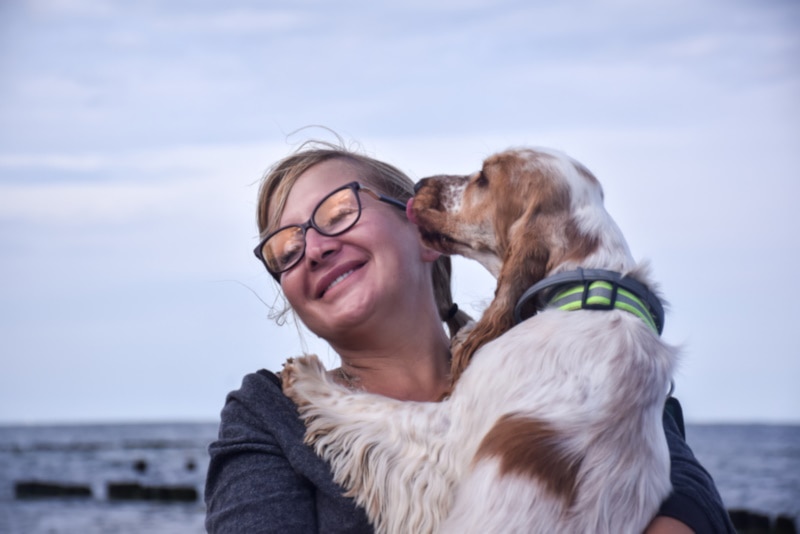
5. Hunger
If your dog is not getting enough food or nutrients, they might start eating non-food items, including hair. This could indicate that their diet is lacking in essential nutrients. It’s important to provide a balanced diet for your dog, and if you notice this behavior, you should consult your vet.
6. Attention Seeking
Eating hair can be a way for your dog to get your attention, especially if it elicits a strong reaction from you. Dogs are clever creatures and quickly learn what actions get them attention, even if that attention is negative. Ignoring the behavior and rewarding them when they stop can help break this habit.
7. Curiosity
Dogs explore the world with their mouths. Your dog might just be curious about the texture or taste of your hair. While this curiosity is natural, it’s crucial to discourage hair eating to prevent possible health issues.
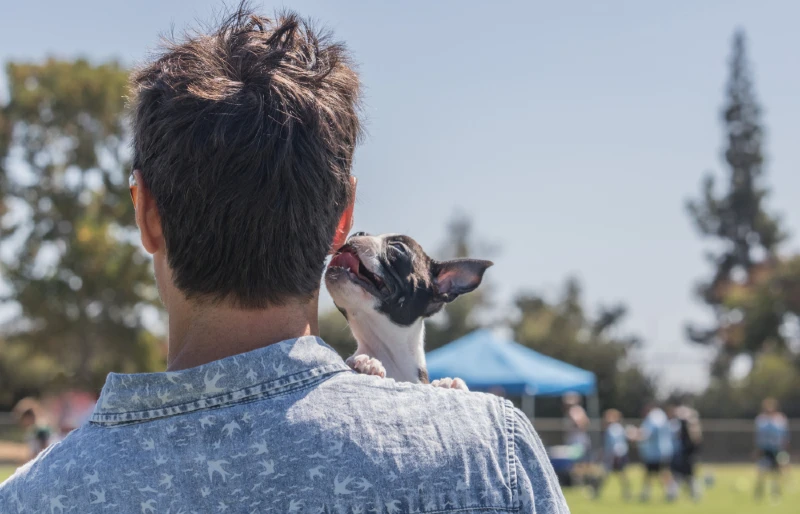
8. Playfulness
Sometimes, dogs might eat your hair during play. They don’t understand that it’s not a toy! While it’s all fun and games for your dog, ingesting hair can lead to digestive problems. It’s essential to provide suitable toys for playtime and keep your hair out of reach.
9. Comfort
Dogs have a strong sense of smell. They might be attracted to the smell of your hair products. The scent of their owner can be comforting to them. Eating your hair might be a way for them to feel close to you. Some dogs might just like the taste of your hair. While this might seem funny, it’s important to discourage hair eating due to the potential health risks. Providing them with a piece of clothing or a blanket that smells like you can offer the same comfort without the risks.
10. Mimicking Behavior
Dogs often mimic the behavior of their owners. If they see you brushing or touching your hair often, they might try to do the same. This copycat behavior is a testament to your bond with your dog, but it’s also important to discourage them from eating hair.
11. Cleaning Up
Dogs might eat hair while trying to clean up their environment. This could be true if dogs are eating hair that is not on your head, but that has fallen out on the floor or shower. Dogs that are particular about cleanliness may be more prone to this behavior. Regularly cleaning your home and removing loose hair can help prevent this.
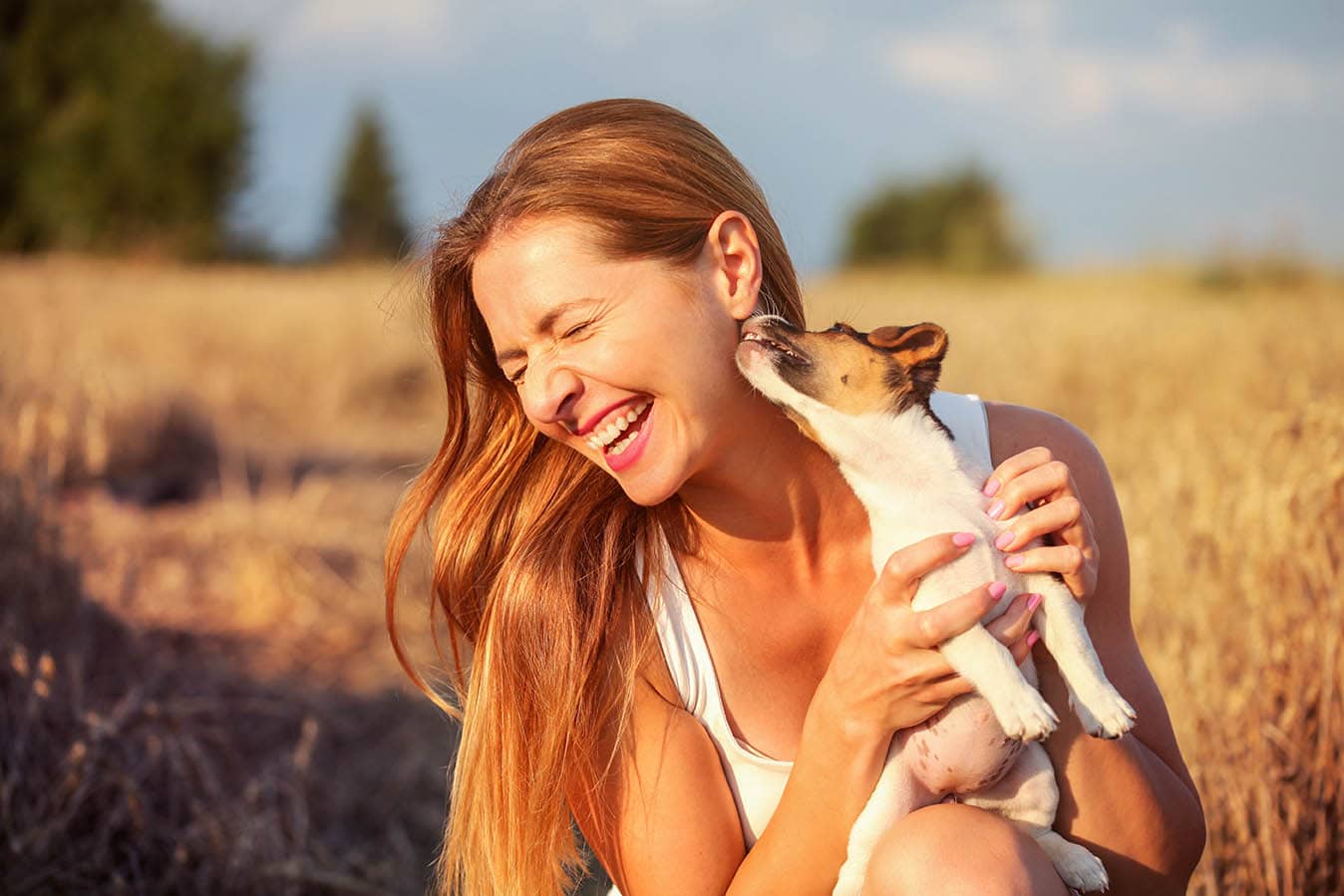

Tips for Keeping Your Dog Safe & Preventing Them from Eating Hair
1. Monitor Your Dog
Don’t leave your dog unattended in areas where they might find hair to eat. This includes bathrooms and bedrooms, where loose hair is likely to accumulate.
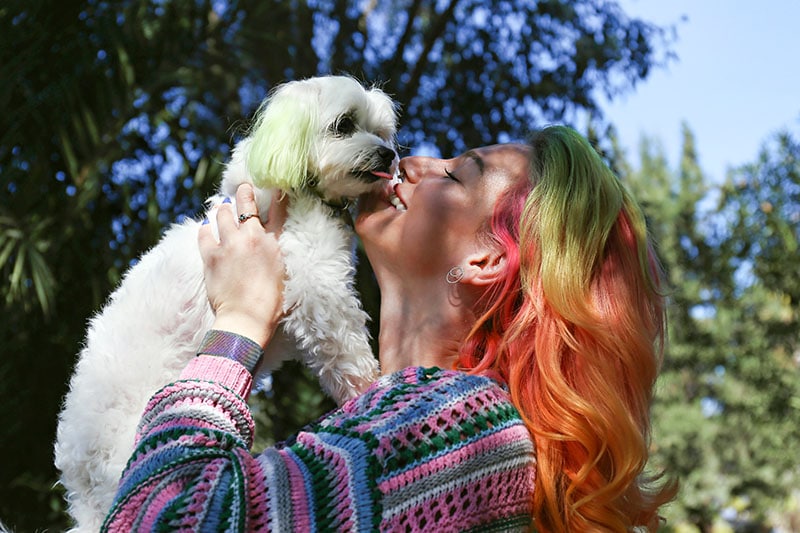
2. Provide Plenty of Physical and Mental Stimulation
Dogs are active creatures that require regular exercise and mental stimulation to keep them healthy and happy. Without these, they can become bored and resort to destructive behaviors such as eating hair. Activities such as walks, playtime, puzzle toys, and training sessions can help keep your dog mentally and physically stimulated.
3. Maintain a Consistent Feeding Schedule
A consistent feeding schedule ensures that your dog’s nutritional needs are being met. This can prevent them from seeking out non-food items like hair to eat. Make sure your dog is getting a balanced diet suitable for their age, breed, and health status.
4. Regularly Groom Your Dog
Regular grooming can help keep your dog’s coat free of loose hair that they might be tempted to eat. Brushing your dog daily can also serve as a bonding activity and can help you monitor the health of their skin and coat.
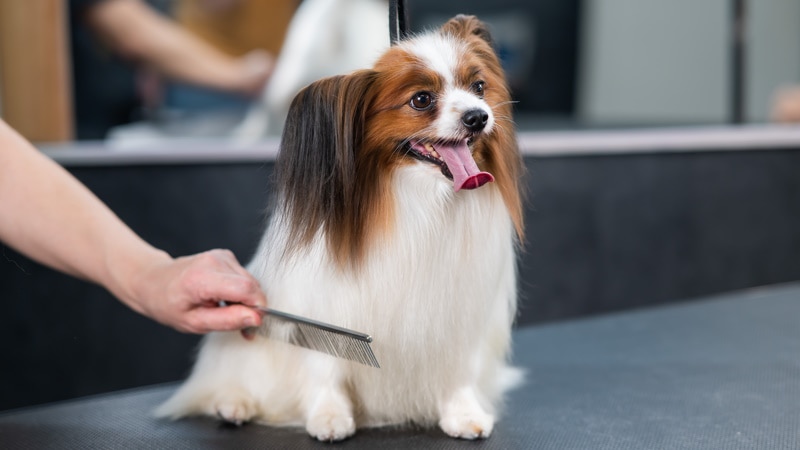
5. Keep Your Hair Out of Reach
If your dog has a tendency to eat hair, try to keep your hair tied up and out of their reach. Also, make sure to clean up any loose hair from your floor and furniture.
6. Use Dog-Safe Toys
Dog-safe toys can provide a distraction for your dog and discourage them from eating hair. Chew toys, in particular, can satisfy your dog’s natural urge to chew and keep them occupied.
7. Regular Vet Check-Ups
Regular vet check-ups can help detect any health issues that might be causing your dog to eat hair. If your dog’s hair-eating habit is accompanied by other concerning behaviors, it’s especially important to seek veterinary care.
8. Reinforce Positive Behavior
Positive reinforcement can be an effective strategy in curbing unwanted behaviors. When your dog refrains from eating hair, reward them with treats, praise, or extra playtime. This will encourage them to repeat the positive behavior.
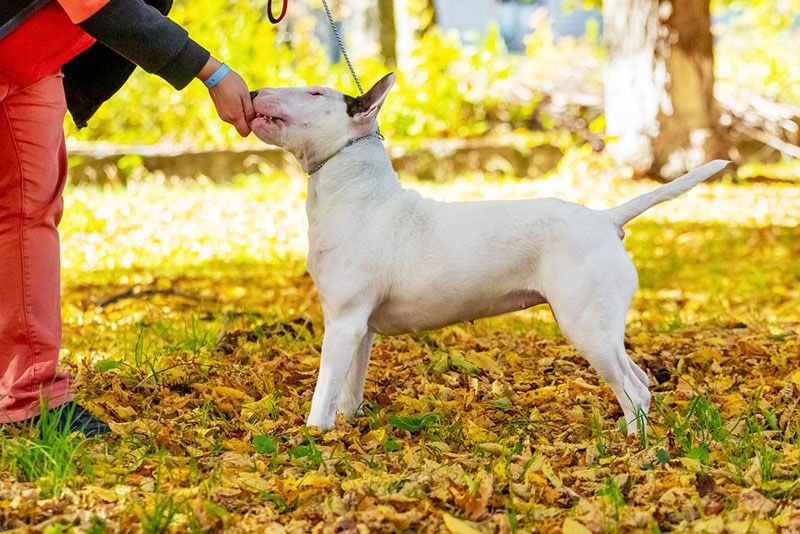
9. Be Patient and Persistent
Changing a dog’s behavior takes time and consistency. Be patient with your dog and persist in your efforts to discourage hair eating. Remember, every dog is unique and what works for one might not work for another. It may take some time to figure out what strategy works best for your furry friend.
10. Seek Professional Help if Necessary
If your dog is eating hair due to anxiety, it might be beneficial to seek help from a professional dog trainer or behaviorist. They can provide strategies and techniques to help manage your dog’s anxiety and curb unwanted behaviors.

Other FAQs About Dogs Eating Hair
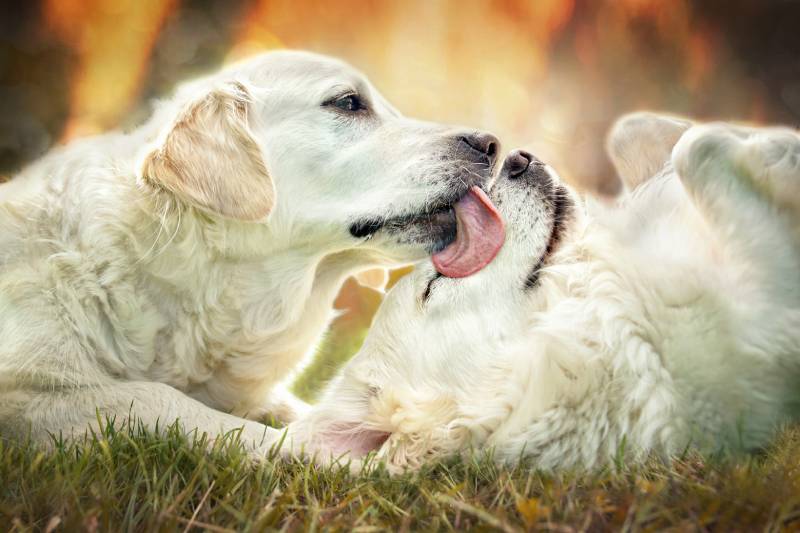
Q: Why does my dog eat other dogs’ hair?
A: This could be due to grooming instinct, curiosity, or even dominance.
Q: What should I do if my dog has eaten a large amount of hair?
A: If your dog has ingested a large amount of hair, it’s best to contact a veterinarian for advice.
Q: Will my dog grow out of this behavior?
A: Some dogs may grow out of this behavior, while others might need training or medical intervention.
Q: Can a change in diet help?
A: If the behavior is due to nutritional deficiencies or hunger, a change in diet might help.
Q: Can I use a muzzle to stop my dog from eating hair?
A: While a muzzle can physically prevent your dog from eating hair, it’s not a long-term solution and does not address the root cause of the behavior.

Conclusion
Our furry friends can sometimes engage in behaviors that leave us scratching our heads. The key to understanding these behaviors lies in observing and understanding their unique personalities and instincts. So, the next time your dog decides to snack on your hair, remember, it’s just another day in the life of a pet parent.
Featured Image Credit: Rebecca Scholz, Pixabay
Tags
What do you think?
Related Articles

New Puppy Checklist: Gear You’ll Need for Your New Dog
Getting a new puppy is really exciting, but before you welcome them home, it’s important to prepare your space for them. Since puppies need a

How Big Do Mini Poodles Get? Vet Reviewed Average Weight & Growth Chart – Dogster
The information is current and up-to-date in accordance with the latest veterinarian research. Learn more » When you buy a Miniature Poodle, you might not

Can Police Dogs Smell Nicotine? Vet Verified Facts & Info – Dogster
The information is current and up-to-date in accordance with the latest veterinarian research. Learn more » While cigarette sales have been declining steadily for decades,

How Old Is 5 in Dog Years? Vet-Approved Guide to Each Size of Dog – Dogster
The information is current and up-to-date in accordance with the latest veterinarian research. Learn more » A common method for calculating a dog’s age is

